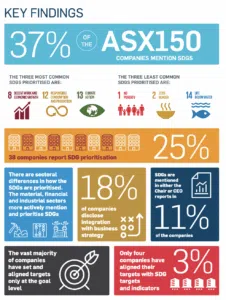
Case Studies, News, Sustainable Development Goals
Reality Check: Raising Ambition and Impact
Kylie Porter | November 22, 2019
Businesses cannot thrive in a world of poverty, inequality, unrest and environmental stress, and so it has a vital interest in ensuring that the 2030 Agenda for Sustainable Development and its 17 Sustainable Development Goals (SDGs) are delivered. (Integrating the SDGs into Corporate Reporting: A Practical Guide, 2018).
For the private sector, acting responsibly and working towards the Sustainable Development Goals (SDGs) is no longer just a moral imperative or the ‘right thing to do’, it is a business imperative. Shareholders, investors and the broader community increasingly expect companies to not just provide goods and services and deliver strong economic returns, but to also take responsibility for the social and environmental implications of their actions.
The SDGs provide a powerful, common lens and framework through which stakeholders, including businesses, can disclose their contribution to sustainable development. In a language which transcends sectoral boundaries and has become far more mainstream, the SDGs provide us with a roadmap to end poverty, fight inequality and injustice, and tackle climate inaction by 2030.
Most businesses across Australia will already act and report on topics that sit across the SDGs. But as we approach the end of 2019 and amid the growing urgency to deliver on this global agenda for sustainable development, governments and businesses must tackle the reporting challenge and demonstrate how they are going to measure their impacts by 2030. The decade to deliver is now upon us and so it is imperative that we ask ourselves whether we are doing enough to achieve these goals and how our contributions across Australia are staking up?
Unfortunately, the answer to those questions is rather simple and can be summed up in two words – not well.
Measuring Impact
A recently released study carried out by RMIT University and supported by the Global Compact Network Australia (GCNA), ‘SDG Measurement and Disclosure by ASX150’, sought to assess the extent to which the top 150 ASX companies are integrating and disclosing their uptake of SDGs in their business strategies through their annual reporting processes. It found that just 37% of these companies mention the SDGs in their annual/sustainability reports.
The report also found that whilst the vast majority of those companies had aligned targets at the goal levels, only 3% of the companies had aligned their business targets with SDG targets and indicators.
Whilst mentioning the SDGs in your annual and sustainability report is certainly a good first step, not identifying the indicators that best align with your own business demonstrates a weakness in reporting practices. Selecting indicators to measure your impacts and analyse your performance against the SDGS is fundamental and absolutely critical in order to transparently hold your company accountable to its sustainability goals.
Although private sector engagement with the SDGs has been slow and somewhat muddled, the report does identify twenty ASX companies whose measurement and disclosure practices are considered strong and demonstrative of good practice. Companies such as AGL, ANZ, Brambles, Fortescue Metals Group, NAB, Rio Tinto, Sydney Airport, Telstra, Transurban, Westpac, Woolworths and Worley Parsons Limited were highlighted for their stronger performance in this space in comparison to the rest of the ASX 150. These companies are all participants of the UN Global Compact.
Many of these companies have prioritised specific SDGs based on risks and benefits to the company, people and the environment; signalled commitment through clear governance structures such as sustainability committees that oversee the SDGs; or illustrated measurement matrices to demonstrate how they will report against one or more of the SDGs. These companies also have strong support from the Board which demonstrates the need to set the ‘tone at the top’ when implementing the Goals into business strategy.
Why reporting matters?
The importance of measuring and reporting private sector contributions to the SDGs provides unique benefits and opportunities:
- Opportunity for businesses to demonstrate to investors, competitors and customers how and why the SDGs are fundamentally shaping the way they do business responsibly and sustainably.
- Shows that a business understands global trends and the implications of these for their business.
- It is an important means of demonstrating the capacity to comprehensively address a company’s risk profile and the strategies that mitigate these risks and strengthen resilience.
- Enables an environment to capture the US$12 trillion worth of market opportunities that the SDGs present by 2030 (Business Commission for Sustainable Development).
Ignoring these opportunities is not only a poor financial planning, but suggests to external stakeholders an inability to innovate, adapt and take advantage of new market opportunities.
Reporting should also be viewed in the landscape of the decline in public trust in the private sector and institutions alike. Businesses are increasingly expected to transparently report how they are managing and mitigating sustainability matters, and the SDGs provide a powerful universal framework through which to do this. And with 75% of people expecting CEOs to take a public stance on large societal issues (Edelman Trust Barometer, 2019), reporting is one way that businesses can demonstrate that they are acting on the calls from their stakeholders.
In addition to demonstrating the business argument for engagement with the SDGs, widespread and standardised reporting on business alignment and contribution to the SDGs will play an important role in driving increased corporate buy-in. Measurement and reporting demonstrate the tangible impact that the private sector can have on large societal issues such as human rights, climate change and inequalities. And private sector engagement is absolutely critical if we are to address these issues.
Towards 2030
With transparency fast becoming the new normal for carrying out business, it is important for government, civil society, academia and business to work collaboratively, learn from each other and develop a more robust and systematised set of matrices in support of achieving the SDGs. That said, reporting for the sake of reporting will only get you so far and will not enable you to capture the richness associated with working towards meeting one or more of the Goals. It is also important that authenticity in reporting underly the work in this space and that the path to achieve the Goals is illustrative of both the successes and failings that you have encountered.
Businesses should also avoid cherry-picking SDG targets and goals based on what is easiest for the company, rather than what is most material to the company. Once your goals and targets have been identified there are huge opportunities to develop a series of actions that contribute to delivering on the Goals. Disclosing these efforts and demonstrating how you are driving and delivering positive change could yield substantial benefits. It is just important to not fall in the trap of relabelling all of your work in SDG terms but rather ensuring that the SDGs actually drive your thinking and strategies.
We understand that measuring impact and reporting against intractable societal issues is never going to be easy, but the value of doing so systematically and transparently far outweighs the cost. Through innovative trial and error, transparent reporting of experiences, learnings and impact, and strong collaborative partnerships the private sector will be able to strongly contribute to achieving this 2030 Agenda.

